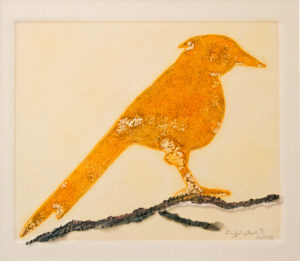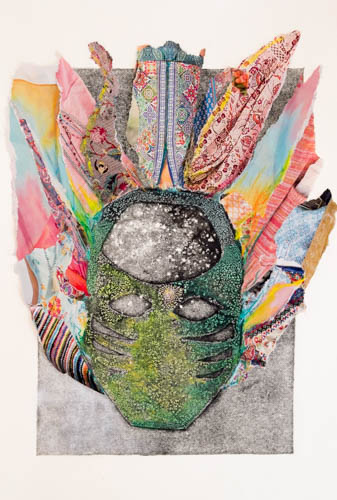No one group — ethnic or otherwise — can have ownership of being in a relationship with Spirit. Wars have been and are being fought because each faction claims, “God is on our side!”
Spirit found me years ago, a small child standing outside in awe of the sunlight and breeze, playing tag in the tree leaves.
I was raised in a spiritually devoid household and therefore had no guidelines, no rituals, or teachings with which to put my experience and feelings into context. As a young adult, I became what is nowadays so often ridiculed as a “new age seeker” to understand better my own very personal, deeply moving spiritual experiences, more than one of which were near-death experiences. In so doing, I have become a diviner in the African Dagara tradition and a shamanic practitioner in my own rather eclectic way.

In part, because many seekers like myself have turned to older cultures for guidance in their quest for spiritual connection, many voices and articles have recently appeared concerned about what is being named “cultural appropriation.” I cannot help but find myself pondering where the line is between accruing knowledge, tools, and techniques, say, and what is being named and shamed as “appropriation.” I get confounded by terms like “theft” and “appropriation” seemingly interchangeably. I have always understood “theft” to mean taking away another’s property without permission and with further intent to gain from that removal, a result of which the rightful owner experiences loss – of current and future use and gain.
And while I very much dislike the inane and thoughtless ways holy symbols and objects that originated as sacred are now popularly and secularly used — i.e., fashion layouts sporting feathered headdresses, crucifixes on earrings, dharma wheels on wrapping paper, and the like – I do not think that is that really in the same category as the act of researching and learning how a culture prays, calls in spirit, or interacts or identifies with the divine. Is it wrong to try to see if these ways resonate with one if not born in that particular group? I think we cannot lump the two together. It is possible to differentiate between respect and disrespect, honoring and dishonoring – and act accordingly.
Further inquiry into the cultural appropriation concept reveals this explanation: “Cultural appropriation, at times also phrased cultural misappropriation, is the adoption of elements of a minority culture by members of the dominant culture. Because of the presence of power imbalances that are a byproduct of colonialism and oppression, cultural appropriation is distinct from equal cultural exchange.” (https://en.wikipedia.org/wiki/Cultural_appropriation)
I do have to think hard & look at my own intentions and motivations, which is always a good thing. On my own, I have, over the years, studied some diverse spiritual philosophies, practices, and traditions – Christianity a bit, different kinds of meditation, as well as the African Dagara divining tradition. Because theirs was not one-culture specific but about universal earth medicine practices, it was with The Foundation for Shamanic Studies that I studied shamanism (also a word currently under attack as having been “taken from” a specific group).

I totally understand the underlying concern here. Talk about appropriation – we have only to look into the early Christian Church! I think it is interesting to note that those people in particular who came to North America from other countries often did so to escape (Christian) religious persecution of some sort; others brought to the Americas in bondage were ripped from their original cultural and spiritual heritages, and not allowed to practice them. But in its early history, Christianity appropriated many earlier rituals and celebrations to popularize and familiarize its message among the population. Many Christian events, celebrations, and rituals are known to have bona fide pagan, druidic, and gnostic lineages. A kinder way to say this might be that the Christian events (Christ’s birthdate, resurrection, etc.) simply borrowed some long-standing rituals and dates, like the Winter Solstice, celebration of the harvest, annual astronomical events and the like. Scholars accept this as what was considered the, er, necessary cultural appropriation in order for the Christian church (for quite a long time at war within itself) to become established among the people. But time passed, the Church settled into its authoritarian role, and those disillusioned with a Christianity that reserved spiritual contact only for and through the priest-elite started looking elsewhere…hence migrations, sometimes forced, to the North American continent and elsewhere.
Please understand I do not condone actions that undercut another’s ability to have and practice their ways to an authentic spiritual life. I am not always clear on what constitutes theft (taking away entirely without permission for personal gain) and appropriation (taking, using as one’s own without permission at the expense of another) versus sharing, spreading, and teaching. How is it that one group might feel they have exclusive rights (ha! Rites? My silly play on words) to greater knowingness and the right to exclude others from this knowledge? Or way to knowledge and understanding? Am I just being naïve?
I understand the need for respectfulness. I understand the wish to be asked for permission. But I do not yet understand the desire to withhold. Especially in our world of instant global communication, doesn’t sharing, teaching, and learning lead us to a more integrated world? One hopes.
Perhaps at its core, the issue of cultural misappropriation is not about who but how.
It is all food for thought. I would love to hear comments from any readers.



Every human endeavor and action is ultimately “cultural”. Logically this extends to ALL human emotions, thoughts, hopes, dreams. Everything worthwhile is ultimately kept, used; appropriated. Food, tools, music, weapons; all the “stuff” that works, is innovative, as humans we keep use, improve if we can. A pinch of salt here in the stew, a cut barb on the spear head there. If a new thing comes into our hands or our imagination as humans we “fiddle” with it, change it and often as not improve it. While it is true I will never, (EVER) be “woke”. The notion is too grammatically repellant. I understand the notion. It isn’t new, different or particularily unique. Some of us have been awake and bright eyed for a few millenia. However, as a small aside, a sweet family custom some what appropo. Every Christmas our little table creche has the usual cast of characters, including a battered toy cow, some cotton ball sheep made in a kid craft project decades ago and an out of proportion collie who is bigger than the cow. In the manager is the infant. He is on his back, little chubby arms outstretched, looked upon by his adoring parents. The holy child wears his red stocking hat with a sprig of green because he born mid winter of virgin birth, it is HIS birth we celebrate at that time of year. The birth of the baby Mithra. We reinforce our “culture”, our customs with those we love. We appropriate everything good and wonderful we can. There is so much and we try to be mindful of it every waking day. Did I mention that we have a Santa dragon just behind the wisemen? He started life as a pastic dinasaur and then…never mind, you get it.